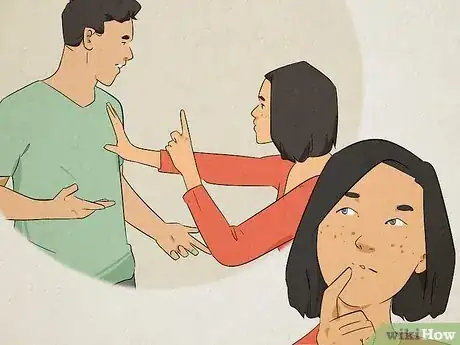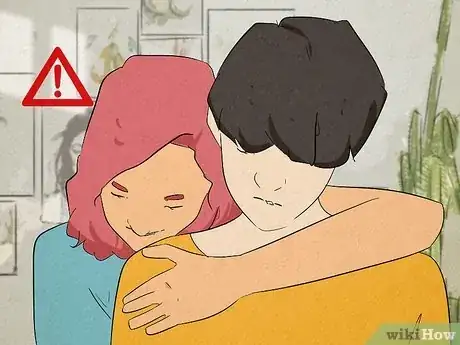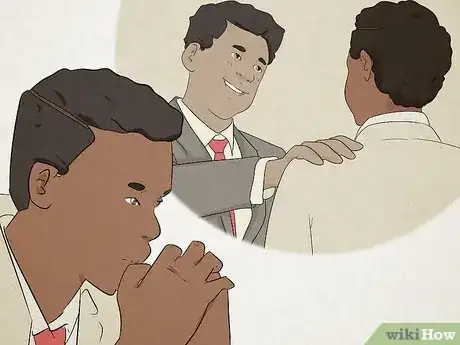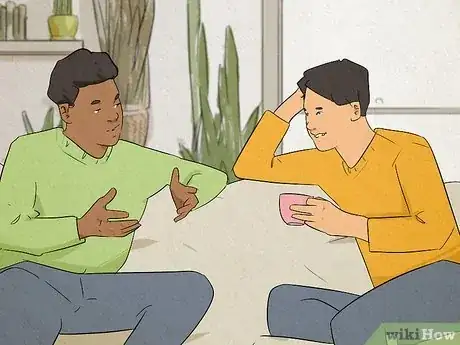This article was co-authored by Rebecca Tenzer, MAT, MA, LCSW, CCTP, CGCS, CCATP, CCFP. Rebecca Tenzer is the owner and head clinician at Astute Counseling Services, a private counseling practice in Chicago, Illinois. With over 18 years of clinical and educational experience in the field of mental health, Rebecca specializes in the treatment of depression, anxiety, panic, trauma, grief, interpersonal relationships using a combination of Cognitive Behavioral therapy, Psychodynamic therapy, and other evidence-based practices. Rebecca holds a Bachelor of Arts (BA) in Sociology and Anthropology from DePauw University, a Master in Teaching (MAT) from Dominican University, and a Master of Social Work (MSW) from the University of Chicago. Rebecca has served as a member of the AmeriCorps and is also a Professor of Psychology at the collegiate level. Rebecca is trained as a Cognitive Behavioral Therapist (CBT), a Certified Clinical Trauma Professional (CCTP), a Certified Grief Counseling Specialist (CGCS), a Clinical Anxiety Treatment Professional (CCATP), and a Certified Compassion Fatigue Professional (CCFP). Rebecca is also a member of the Cognitive Behavioral Therapy Society of America and The National Association of Social Workers.
There are 17 references cited in this article, which can be found at the bottom of the page.
wikiHow marks an article as reader-approved once it receives enough positive feedback. In this case, several readers have written to tell us that this article was helpful to them, earning it our reader-approved status.
This article has been viewed 382,499 times.
It’s disheartening to realize you’re shutting out the people you care about, but don’t get down on yourself – you can learn to keep your friends and family members close. Start by working on healing the root causes of your avoidance. Then, strive to be more open with others and learn to make your relationships a priority. Finally, make sure you aren’t accidentally driving people away with annoying personality traits.
Steps
Ways to Heal
-
1Think about how you’re feeling right before you push someone away. Most of the time, people shut others out because they’re afraid of something. Think about the last time you pushed someone away, and ask yourself what you were scared of. Once you understand why you behave this way, you’ll be in a better position to start making changes.[1]
- You may have experienced trauma or hurt in a previous relationship, so you push people away to protect yourself from more hurt.[2]
- Journaling or free-writing might help you figure out what's at the root of your behavior. Start a page about relationships and write down everything that comes to mind when you think of that term. After a few minutes, review what you came up with.
- For instance, you might be afraid that people will dislike you once they get to know you, or you might be afraid that people will take advantage of you after you start to trust them.
-
2Boost your self-esteem. It's common for people with low self-esteem to push others away because they may not think they deserve positive relationships. If your self-esteem is low, you might engage in negative self-talk that reinforces your feelings of being disconnected from others.
- In addition, you might constantly repeat self-deprecating statements like "I don't deserve happiness" or "People hate me." These statements only make you feel worse.
- Instead of engaging in negative self-talk, promote a healthy self-esteem by listing your best traits. Then, turn these traits into powerful affirmations, such as "I am a great listener" and "I try to show compassion for others."[3]
- Repeat these statements several times daily.
Advertisement -
3Examine your trust levels. Another reasons behind a push-and-pull relationship might be trust issues. If you've been hurt in the past, you might find it difficult to let down your walls and be vulnerable with others. In order to stop this pattern, you will need to risk being hurt again. That's the only way to give others the chance to earn your trust.[4]
- It may be helpful to voice your concerns to any new partners. Let them know that you have trouble trusting, and ask that they be patient and work with you.[5]
- Take baby steps by giving a new partner the chance to be there for you. For example, you might ask them to support you with a passion project or you might request that they attend a social gathering with you. If they come through for you, you might gradually increase the level of trust you have in them.
-
4Be open about your readiness for intimacy. You may push others away because you are at different places in your readiness for intimacy. One person might want closeness while the other needs time, and vice versa. If you and the other person are on different wavelengths, it can create an imbalance that interferes with the health of the relationship. Gain insight about your readiness for different types of intimacy and share it with the other person.[6]
- For instance, you might push a friend away because they disclose personal information early on in the friendship. You might feel uncomfortable with such a disclosure and not know how to communicate that, so you push the person away.
- Instead, you might say, "I appreciate you for sharing that with me, but I hope you can understand if I am unable to share such personal stuff with you right now. It takes me some time to open up."
- Readiness for intimacy involves not just intimate disclosures, but also physical, emotional, and spiritual closeness.
-
5Replace guilt with empathy. If you have hurt someone you care about, you might react to the feelings of guilt by pushing that person (and others) away. To counteract this, notice times when you betray or hurt a loved one and then attempt to push them away. Then, step outside of your own experience into that other person's. Try to understand why they may have been hurt.
- For example, think about what that person went through and how the situation must have felt for them. How would you feel if the same thing happened to you?
- Once you have tried to have true empathy for the person, you can attempt to apologize and make amends for any wrongdoing. However, empathy is necessary in order for you to connect with the other person's experience instead of closing them out.[7]
-
6See a therapist. If you’re having a hard time changing your ways by yourself, book a session with a therapist.[8] They’ll be able to help you identify the thoughts and feelings that lead to pushing people away. A therapist will also be able to help you change your habits so you can maintain healthy relationships.[9]
How to Open Up
-
1Let your comfort level be your guide. Look within yourself to decide how comfortable you feel opening up to someone. You may feel more vulnerable at some times than you do at others, and it's okay to guard yourself when you don't feel comfortable. Identify what you are comfortable with, as well as what makes you uncomfortable.
- Each time you're with someone, take small steps to push yourself to get closer to them while still honoring your comfort level.[10]
- You might start by offering a nice comment to a coworker. On another encounter, you might offer them a small token of friendship, such as a donut or coffee. When you feel ready, you could invite them to do something.
-
2Have a friendly demeanor. Smile and greet people when you see them. If someone makes small talk with you, participate in the conversation instead of giving them one-word replies. When you see someone you know, take a minute to say hello and ask how they are.[11]
- If you’re shy, you might be used to minding your own business in public, so start slowly. Work on making eye contact and smiling. When you feel more comfortable, start chatting with people more often.
-
3Stay receptive. Be willing to meet new people and expand your social horizons. See the good side of your friends and acquaintances, and take an optimistic view of your relationships. If any new opportunities or invitations come your way, accept them.[12]
- For instance, if your classmate asks you to study with her later, say yes, even if you aren’t sure you’ll like it. Give her (and yourself) a chance.
-
4Ask people questions about themselves. Build connections with other people by being interested in them. Try to find out more about your acquaintances’ goals, families, likes, and dislikes. When you’re with your friends, ask them about any projects they’ve been working on or issues they’ve been dealing with lately.[13]
- For instance, you could ask something like, “Why did you decide to major in architecture?” or “How are you liking your new apartment?”
- Of course, you don’t want to ask anything too personal, like “Why are you getting divorced?” unless you know the person well and get the sense that they want to talk about it with you.
-
5Share things about yourself. To maintain a friendship, asking questions isn’t enough – you’ve got to talk about yourself, too. As you get to know people, share more of your thoughts and personality quirks. Opening up to others will make them feel like you’re invested in the relationship.[14]
- For instance, if your closest pals are sharing their dreams, it might be nice to share your own. You might say, "You know I've always secretly dreamed of spending a year traveling the world."
- Consider telling your close friends that you’re trying to stop pushing others away. That will help your friends understand you better. They may even be able to help you, if you let them.
-
6Make an effort to stay in touch. Once you’ve connected with someone, do your best to keep them in your life. Don’t cancel social plans you’ve made, even if you feel anxious. Respond to your friends promptly when they reach out to you, and if you don’t hear from someone for a while, call or text them yourself.[15]
- Keeping in touch with people can be hard work, especially if you’re used to ducking out of relationships when you get uncomfortable. However, if you want to keep people around, you’ve got to stay on their radar.
- If you’re really not feeling up to talking, don’t leave your friends hanging. Say something like, “I can’t meet up today, but I’d love to see you soon. How about Thursday?”
-
7Repair damaged relationships. If you’ve let things lapse with someone you care about, call them up or email them. Explain why you pushed them away, and apologize for any hurt you caused them. If they’re willing to revive the relationship, promise to treat them better in the future.[16]
- If a former friend doesn’t want to revive the friendship, accept their answer and leave them alone, but let them know they can contact you if they change their mind.
- Keep in mind that apologizing won’t fix a broken relationship overnight. To make things right in the long term, you’ll have to be a better friend from here on out.
Interpersonal Tips
-
1Avoid being clingy. Make sure you aren’t smothering people with attention. Don’t pester them to hang out with you every day or blow up their phone with texts. If you tend to be clingy, find some solo hobbies and goals to keep you busy.[17]
- For example, join a new club or organization where you can meet new friends so you're not always spending time with just one person.
-
2Ask yourself if you complain too much. Are you always complaining about the food, the weather, or other people? Spending time around a complainer is tiresome, and people may start avoiding you if you’re a negative Nancy. When a complaint pops into your head, see if you can turn it around and find something good to say instead.[18]
- To counteract complaints, start practicing gratitude. When you recognize what you do have, you are less likely to complain.
- Write down two to three things each day that you are grateful about.
-
3Look at the balance of give-and-take in your relationships. If you’re always looking for a favor, but you never help others out, people might not want to be around you. Make sure you aren’t asking for too much from other people, and offer to give your friends and acquaintances a hand when they need it.[19]
-
4Think about whether you need a lot of validation from others. It can be exhausting to deal with somebody who needs constant attention and praise, or who fishes for compliments all the time. Make sure you aren’t doing this. If you have low self-esteem, look for a healthier way to feel good about yourself.[20]
- For instance, you could raise your self-esteem by getting involved in a sport, joining a volunteer program, or making the time to take care of your health.
-
5Address problems in relationships. Conflict is a natural part of every relationship. If you bury your head in the sand whenever you have a disagreement with someone, you’ll never learn how to stay close to people – and most of your relationships will end on bad terms. Instead of hiding from conflict, talk it through with the other person and find a solution.[21]
Expert Q&A
Did you know you can get expert answers for this article?
Unlock expert answers by supporting wikiHow
-
QuestionWhy do I push people away?
 Rebecca Tenzer, MAT, MA, LCSW, CCTP, CGCS, CCATP, CCFPRebecca Tenzer is the owner and head clinician at Astute Counseling Services, a private counseling practice in Chicago, Illinois. With over 18 years of clinical and educational experience in the field of mental health, Rebecca specializes in the treatment of depression, anxiety, panic, trauma, grief, interpersonal relationships using a combination of Cognitive Behavioral therapy, Psychodynamic therapy, and other evidence-based practices. Rebecca holds a Bachelor of Arts (BA) in Sociology and Anthropology from DePauw University, a Master in Teaching (MAT) from Dominican University, and a Master of Social Work (MSW) from the University of Chicago. Rebecca has served as a member of the AmeriCorps and is also a Professor of Psychology at the collegiate level. Rebecca is trained as a Cognitive Behavioral Therapist (CBT), a Certified Clinical Trauma Professional (CCTP), a Certified Grief Counseling Specialist (CGCS), a Clinical Anxiety Treatment Professional (CCATP), and a Certified Compassion Fatigue Professional (CCFP). Rebecca is also a member of the Cognitive Behavioral Therapy Society of America and The National Association of Social Workers.
Rebecca Tenzer, MAT, MA, LCSW, CCTP, CGCS, CCATP, CCFPRebecca Tenzer is the owner and head clinician at Astute Counseling Services, a private counseling practice in Chicago, Illinois. With over 18 years of clinical and educational experience in the field of mental health, Rebecca specializes in the treatment of depression, anxiety, panic, trauma, grief, interpersonal relationships using a combination of Cognitive Behavioral therapy, Psychodynamic therapy, and other evidence-based practices. Rebecca holds a Bachelor of Arts (BA) in Sociology and Anthropology from DePauw University, a Master in Teaching (MAT) from Dominican University, and a Master of Social Work (MSW) from the University of Chicago. Rebecca has served as a member of the AmeriCorps and is also a Professor of Psychology at the collegiate level. Rebecca is trained as a Cognitive Behavioral Therapist (CBT), a Certified Clinical Trauma Professional (CCTP), a Certified Grief Counseling Specialist (CGCS), a Clinical Anxiety Treatment Professional (CCATP), and a Certified Compassion Fatigue Professional (CCFP). Rebecca is also a member of the Cognitive Behavioral Therapy Society of America and The National Association of Social Workers.
Clinical Therapist
-
QuestionOver many years, I have had an acquaintance that has been verbally abusive. I think I have finally had enough, yet I still love them. How do I stop paying attention and stop my heart from caring?
 Tasha Rube, LMSWTasha Rube is a Licensed Social Worker based in Kansas City, Kansas. Tasha is affiliated with the Dwight D. Eisenhower VA Medical Center in Leavenworth, Kansas. She received her Masters of Social Work (MSW) from the University of Missouri in 2014.
Tasha Rube, LMSWTasha Rube is a Licensed Social Worker based in Kansas City, Kansas. Tasha is affiliated with the Dwight D. Eisenhower VA Medical Center in Leavenworth, Kansas. She received her Masters of Social Work (MSW) from the University of Missouri in 2014.
Licensed Master Social Worker While it is still okay to care for the person, it is never okay if you are the victim of verbal abuse (or any kind of abuse), regardless of who this person is. It is advised that you inform this person directly that you will not tolerate the verbal abuse. Give examples of how they may be making you feel and why. Provide an ultimatum that if they are unable to stop, you will need to stop associating with them. Perhaps, if this is a family, friend, or intimate relationship, you both could do counseling together. Sometimes having a mediator involved will help with communication
While it is still okay to care for the person, it is never okay if you are the victim of verbal abuse (or any kind of abuse), regardless of who this person is. It is advised that you inform this person directly that you will not tolerate the verbal abuse. Give examples of how they may be making you feel and why. Provide an ultimatum that if they are unable to stop, you will need to stop associating with them. Perhaps, if this is a family, friend, or intimate relationship, you both could do counseling together. Sometimes having a mediator involved will help with communication -
QuestionHow do I stop responding argumentatively when confronting a conflict?
 Tasha Rube, LMSWTasha Rube is a Licensed Social Worker based in Kansas City, Kansas. Tasha is affiliated with the Dwight D. Eisenhower VA Medical Center in Leavenworth, Kansas. She received her Masters of Social Work (MSW) from the University of Missouri in 2014.
Tasha Rube, LMSWTasha Rube is a Licensed Social Worker based in Kansas City, Kansas. Tasha is affiliated with the Dwight D. Eisenhower VA Medical Center in Leavenworth, Kansas. She received her Masters of Social Work (MSW) from the University of Missouri in 2014.
Licensed Master Social Worker Your best bet is to allow yourself some time to decompress and release your frustrations or anger before you respond to the other person(s) you may be in conflict with. On most occasions, people tend towards reaction, which typically never ends well. The right approach is to reflect on the situation and allow yourself time to think about the events that took place from all angles
Your best bet is to allow yourself some time to decompress and release your frustrations or anger before you respond to the other person(s) you may be in conflict with. On most occasions, people tend towards reaction, which typically never ends well. The right approach is to reflect on the situation and allow yourself time to think about the events that took place from all angles
References
- ↑ https://psychcentral.com/lib/what-is-emotional-abandonment/
- ↑ Rebecca Tenzer, MAT, MA, LCSW, CCTP, CGCS, CCATP, CCFP. Clinical Therapist & Adjunct Professor. Expert Interview. 2 October 2020.
- ↑ https://www.mindbodygreen.com/0-5487/10-Affirmations-to-Boost-Your-SelfEsteem.html
- ↑ https://blogs.psychcentral.com/nlp/2016/11/trust-issues/
- ↑ Rebecca Tenzer, MAT, MA, LCSW, CCTP, CGCS, CCATP, CCFP. Clinical Therapist & Adjunct Professor. Expert Interview. 2 October 2020.
- ↑ https://www.psychologytoday.com/blog/rediscovering-love/201706/pull-in-push-away-intimacy
- ↑ https://www.psychologytoday.com/blog/the-squeaky-wheel/201310/five-very-common-unhealthy-psychological-habits
- ↑ Rebecca Tenzer, MAT, MA, LCSW, CCTP, CGCS, CCATP, CCFP. Clinical Therapist & Adjunct Professor. Expert Interview. 2 October 2020.
- ↑ https://www.helpguide.org/articles/mental-health/finding-a-therapist-who-can-help-you-heal.htm
- ↑ Rebecca Tenzer, MAT, MA, LCSW, CCTP, CGCS, CCATP, CCFP. Clinical Therapist & Adjunct Professor. Expert Interview. 2 October 2020.
- ↑ https://www.psychologytoday.com/blog/your-wise-brain/201211/be-friendly
- ↑ https://www.psychologytoday.com/blog/your-wise-brain/201211/be-friendly
- ↑ http://web.csulb.edu/~tstevens/conversational_skills.htm
- ↑ https://www.washingtonpost.com/news/soloish/wp/2017/04/25/how-to-make-and-keep-friends-in-your-20s/?utm_term=.793a14778901
- ↑ https://psychcentral.com/lib/the-care-and-maintenance-of-friendship/
- ↑ https://www.psychologytoday.com/blog/the-friendship-doctor/200910/5-tips-mending-tattered-friendship
- ↑ https://www.psychologytoday.com/blog/the-intelligent-divorce/201208/who-wants-be-needy-six-solutions
- ↑ https://www.psychologytoday.com/blog/contemporary-psychoanalysis-in-action/201508/no-one-likes-complainer-heres-why
- ↑ https://www.psychologytoday.com/blog/fulfillment-any-age/201411/19-ways-tell-if-you-expect-too-much-your-partner
- ↑ https://tinybuddha.com/blog/how-to-let-go-of-the-need-for-approval-to-start-thriving/
- ↑ https://www.psychologytoday.com/blog/the-freedom-change/201504/fear-intimacy-and-closeness-in-relationships
About This Article
To stop pushing people away, look within yourself to decide how comfortable you feel opening up to someone. Each time you're with them, take small steps to push yourself to get closer to them while still honoring your comfort level. If you usually like to mind your own business, work on just making eye contact and smiling until you feel comfortable enough to chat with people. Build connections with people by asking them questions to show your interest. For example, you might try asking why they chose their major or how they’re liking their new apartment. As you get to know them, start sharing more of your thoughts to keep them invested in the relationship. For more tips from our Relationship co-author, like how repair your relationship with someone you’ve pushed away, keep reading!
















































































